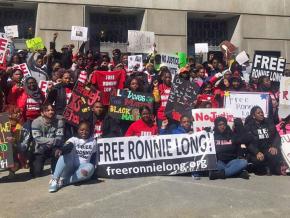Ronnie Long deserves to be free
reports on the efforts of activists to win freedom for Ronnie Long, who has spent decades behind bars despite evidence that he is innocent.
ON MARCH 6, 80 students from Winston-Salem State (WSSU) and Shaw University, as well as several professors, clergyman and local activists clad in “Free Ronnie Long” shirts, packed out a conference room at the state Department of Justice in Raleigh, North Carolina.
The activists met with the staff of Attorney General Josh Stein before taking to the streets for a protest march for Long’s freedom.
Ronnie Long has spent the past 43 years in prison for a crime he — and many others — maintain that he did not commit.
In 1976, the widow of a prominent executive of Cannon Mills was raped by a stranger in her home in Concord, North Carolina. She said her assailant was a “yellow looking” Black man wearing a leather jacket.
After failing to identify anyone in a police lineup, police later called the woman to come to the courthouse, suggesting the assailant might have been in court. From there, the victim picked Ronnie Long, one of the dozens of Black men in the courtroom — an exceedingly irregular identification process.

Long had been in court that day disputing an unrelated trespassing charge. He did not meet the physical description laid out by the victim, but he was a Black male and wearing a leather jacket.
Long was convicted largely on the basis of the victim’s identification, his ownership of a leather jacket and a footprint that did not match shoes that he had — but which was described by the prosecution as possibly having come from shoes like his.
The jury was all-white, personally approved by the sheriff, and at least three of the jurors were employed by Cannon Mills. Ronnie was sentenced to two consecutive life sentences.
There are glaring holes in the evidence. Biological evidence from the rape kit was lost. Physical evidence removed from the scene of the crime, including evidence from carpet swatches and hairs collected from the house where the rape occurred, were withheld from the defense until 2005 when the Innocence Project took up Long’s case — and DNA testing does not match Long.
More than 70 fingerprints taken from the scene of the crime also were withheld from the defense until 2015, when they were discovered by the North Carolina Innocence Inquiry Commission, a state agency that investigates inmates’ innocence claims. Those have also yielded no match to Ronnie.
AT THE March 6 protest, activists who have been dedicating time to this case, as well as Ronnie’s family and friends, made appeals to the office of the attorney general.
In an unusual attempt to show so-called “goodwill,” the attorney general’s staff met with the entire group of protesters. Long’s sister pleaded that their father and two of their sisters have died since Ronnie has been imprisoned, and that their mother is in remission for cancer at age 87 — but holding on with hope that Ronnie will be freed before she dies.
Ashleigh Long, Ronnie’s wife, charged that Ronnie’s case demonstrates that the justice system does not actually care about rape and sexual assault, since in narrowly focusing on punishing Ronnie, there has been no attempt to find the actual assailant. She said that Attorney General Josh Stein doesn’t deserve a re-election if he doesn’t bring justice to Ronnie.
Dr. Larry Little, a professor from WSSU, said that real justice is impossible for Ronnie, since he has already spent the majority of his life in prison for a crime he didn’t commit.
Jasana, a student organizer from WSSU, expressed that if the facts of the case were examined impartially, Ronnie would be free. The time he has already served, Jasana noted, exceeds the sentence for some murder sentences.
The chief counsel for Attorney General Stein responded that they were sensitive to the circumstances of the case, despite still preparing the state’s case against Ronnie for the Fourth Circuit Court.
Even so, they claimed to be empathetic to social justice issues in the case — and pointed to efforts to reform pretrial detention and bail. They went on to say that the case was nuanced and that they were doing their best — and advocated their internship opportunities for a way to get involved, as well as pointing to the state Legislature, saying, “While you’re all fired up, save some for them, they make the laws.”
Chafing at this reply, students and activists charged the attorney general’s office with attempting to pass the buck to the state Legislature and trying to turn a protest into a recruitment event.
Activists have described Ronnie’s conviction as a “legal lynching,” and point to the fact that racial injustice is built into the criminal injustice system. The decades-long ordeal for Ronnie Long, as well as the deaths of nine people in the Durham County Jail during pretrial detention since 2012, are the fault of state officials, and they should be held accountable for these crimes.
This anger fueled protesters as they took to the streets to march from the Justice Department headquarters to the State Legislative Building. Activists with the Ronnie Long Project plan to rally March 20 at the Fourth Circuit Court when Ronnie’s case will be heard in Richmond, Virginia.


